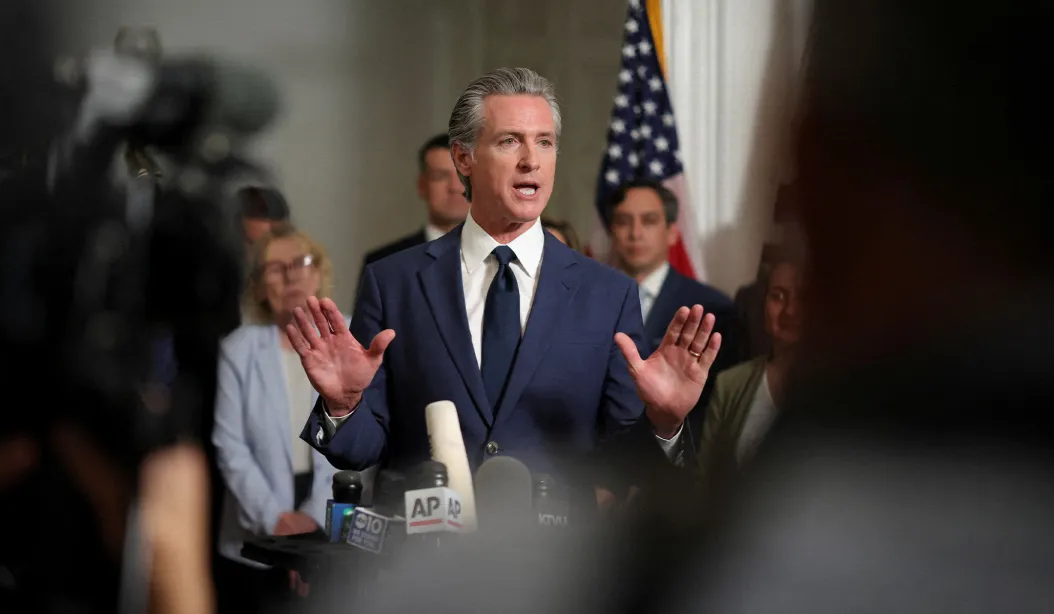[caption id="attachment_35168" align="alignnone" width="1054"]

California Governor Gavin Newsom speaks at a press conference, accompanied by members of the Texas Democratic legislators, at the governor’s mansion in Sacramento, Calif., August 8, 2025.(Carlos Barria/Reuters)[/caption]
By Jack Fowler. Media: Nationalreview
He now finds himself pleading with the beleaguered and vilified industry not to abandon the state.
‘The oil industry has Newsom over a barrel” — that’s the headline of a new Politico piece about California’s chief executive, Gavin Newsom, who is now grappling with stark realities that the Golden State, a fuel-reserve mecca, is becoming a self-induced energy desert. It’s a fitting, if not inevitable, reckoning for a governor who spent years leading the Democratic Party’s scorched-earth crusade against fossil fuels, only to find himself now pleading with the beleaguered and vilified industry not to abandon the state.
The flinching from Sacramento comes as oppressive, expensive policies have resulted in Phillips 66 and Valero announcing the shutting of their state-based oil refineries. Even a self-proclaimed climate-change crusader like Newsom realizes the deleterious consequences of less fuel for California’s millions of gas-dependent vehicles and the skyrocketing of already outrageous gas prices for ever-beleaguered California residents — which is why he’s pressing the California Energy Commission to cut the refineries slack to forestall their closures.
California’s energy unraveling offers a preview of what happens when ideology overrides practical governance. And yet, against the backdrop of closing refineries, ideology cannot but help veering ever left. In addition to draconian laws, regulations, and executive orders, the left has intensified its thrill over employing climate lawfare in an effort to break up Big Oil and turn America into a land of windmills, solar panels, bicycles, and blackouts. If it all seems intentional — this progressive drive to steer the state, and the country, toward a brink of supply shortages, out-of-sight energy bills, economic strain, and significant national-security risks — it is.
Beyond deploying antagonistic laws and mandates against Big Oil, California is actively weaponizing the legal system to target the energy industry. Later this month, a state court will hear arguments in People of the State of California v. ExxonMobil et al., a sweeping lawsuit filed in 2023 by the Newsom administration accusing five major oil companies of deceiving the public about climate change. The state is seeking damages related to wildfires, storms, and extreme heat.
(This being the same state that, under Newsom’s water-hostile leadership, has been blowing up dams generating hydroelectric power, for the sake of salmon.)
It’s an interesting dichotomy, or hypocrisy: Newsom hoping to rebrand himself as an energy pragmatist with last week’s refinery backpedal, while his administration is trying to extract tens of billions of dollars from the very companies it’s now courting to prevent a supply collapse.
Refinery crisis aside, Newsom’s litigation continues unabated. And the ferocity of climate lawfare is not confined to California: Blue states across the country are adopting the Golden State’s strategy, turning to lawsuits and retroactive fines in the name of climate accountability. New York (an energy bonanza atop the Marcellus Shale, the massive natural-gas reserve untapped due to a state ban on hydraulic fracturing) and Vermont have enacted Climate Change Superfund statutes designed to bankrupt U.S. energy companies for past emissions. Hawaii filed a lawsuit this year accusing oil producers of negligence, nuisance, trespass, and harm to public trust resources. Multnomah County, Ore., is seeking over $50 billion in a climate-nuisance suit blaming oil companies for the 2021 heat dome.
(Meanwhile, climate lawfare efforts are also being strategized to protect Green New Deal favorites such as offshore wind power.)
But the climate-change lawsuit activists have struck no gushers. Indeed, some of the wells are dry, as courts are beginning to push back. For example, in Charleston, a South Carolina judge dismissed the city’s lawsuit accusing oil companies of deceiving the public and demanding compensation for flooding and sea-level rise.
The decision adds to a growing chorus of dismissals, even in blue jurisdictions, including cases brought by Baltimore, New Jersey, and Bucks County, Pa. Judges are growing increasingly skeptical of the legal theory behind these suits: In the Charleston case, Judge Roger Young claimed in his dismissal ruling that “under Plaintiff’s theory, virtually anyone could be a plaintiff — and a defendant — in what would effectively amount to a perpetual series of lawsuits that reset after every storm.”
Nevertheless, similar lawsuits continue to emerge in Maine, Delaware, Rhode Island, Illinois, Washington State, D.C., and even Puerto Rico. Together, they amount to a coordinated legal campaign to vilify American energy producers and impose costs designed to make the industry’s survival impossible.
California shows where this activism of severe regulations and “profit caps” and litigation is headed. The state’s downward spiral would be farcical if the consequences weren’t so serious, and so deleterious to residents. The abuse of stretched-to-the-limit refineries — which have found it nearly impossible to operate — and their forthcoming closures could threaten 20 percent of the state’s gasoline supply, with an ensuing price rise that could be as much as 75 percent. This, in a state where residents have already spent much of the past three years paying over $5 a gallon.
(Or worse: In 2024 in Menlo Park, a gallon of gas went for $7.75, an almost-European level.)
Governor Newsom’s scramble to contain the damage, offering subsidies and investor incentives to keep the remaining refineries from closing, is a remarkable about-face from the man who relentlessly disdains the oil industry and spent years driving refineries toward the exit.
As with lawfare, Democrats elsewhere are continuing down the California path, punishing producers while ignoring the practical costs to families and businesses, chasing the same predictable consequences.
freestar
By phasing out gas appliances and vehicles, banning gas-powered lawn equipment, constraining supply, and forcing utilities into costly transitions, progressive states are inflating energy costs, narrowing consumer choice, and making everyday life difficult. Californians already pay 56 percent more for electricity than the national average, despite using less power. In Illinois, another hot spot for climate-change activism, families are facing double-digit utility rate hikes amid surging demand driven by EV adoption and the mandated switch to electric heating. And in New York, energy bills — already some of the most expensive in the country — are rising even further to fund green mandates and forced gas-to-electric conversions.
All of this comes just as demand for affordable, reliable power is poised to explode. AI computing, industrial reshoring, and advanced manufacturing require uninterrupted electricity at scale. In fact, demand might reach levels that exceed the grid’s capacity.
A 2024 analysis from the North American Electric Reliability Corporation warned that much of the country faces elevated risks of blackouts as a result of rising demand and premature coal plant retirements. And while adversaries such as China are accelerating nuclear buildout, left-wing activist groups at home campaign to dismantle existing plants and block new development. The result is a self-inflicted grid crisis, driven by a movement that claims to support decarbonization but rejects the one technology that can deliver it.
The climate movement’s absolutism has brought us here. For years, progressives treated energy producers as enemies rather than assets, ignored warnings of grid reliability, dismissed the economic costs transferred to consumers, and accused anyone who does not play along of being in the pocket of Big Oil.
California’s current crisis is a direct result of that mindset. The rest of America would be wise to take note of that. And of Gavin Newsom’s ploy at being a moderate.
 California Governor Gavin Newsom speaks at a press conference, accompanied by members of the Texas Democratic legislators, at the governor’s mansion in Sacramento, Calif., August 8, 2025.(Carlos Barria/Reuters)[/caption]
California Governor Gavin Newsom speaks at a press conference, accompanied by members of the Texas Democratic legislators, at the governor’s mansion in Sacramento, Calif., August 8, 2025.(Carlos Barria/Reuters)[/caption]

 California Governor Gavin Newsom speaks at a press conference, accompanied by members of the Texas Democratic legislators, at the governor’s mansion in Sacramento, Calif., August 8, 2025.(Carlos Barria/Reuters)[/caption]
California Governor Gavin Newsom speaks at a press conference, accompanied by members of the Texas Democratic legislators, at the governor’s mansion in Sacramento, Calif., August 8, 2025.(Carlos Barria/Reuters)[/caption]
 California Governor Gavin Newsom speaks at a press conference, accompanied by members of the Texas Democratic legislators, at the governor’s mansion in Sacramento, Calif., August 8, 2025.(Carlos Barria/Reuters)[/caption]
California Governor Gavin Newsom speaks at a press conference, accompanied by members of the Texas Democratic legislators, at the governor’s mansion in Sacramento, Calif., August 8, 2025.(Carlos Barria/Reuters)[/caption]


